Book contents
- Frontmatter
- Dedication
- Contents
- List of Illustrations
- Acknowledgments
- List of Abbreviations
- Introduction
- 1 British Sunday Schools before the First World War, 1900–14
- 2 British Sunday Schools and the First World War, 1914–18
- 3 Sunday Schools in the Religious Life of the British Forces, 1914–18
- 4 British Sunday Schools between the World Wars, 1918–39
- 5 Teaching, Training, and Teachers: Reforming the Sunday School Movement, 1900–39
- 6 British Sunday Schools and the World, 1900–39
- Conclusion
- Bibliography
- Index
- Studies in Modern British Religious History
5 - Teaching, Training, and Teachers: Reforming the Sunday School Movement, 1900–39
Published online by Cambridge University Press: 11 January 2024
- Frontmatter
- Dedication
- Contents
- List of Illustrations
- Acknowledgments
- List of Abbreviations
- Introduction
- 1 British Sunday Schools before the First World War, 1900–14
- 2 British Sunday Schools and the First World War, 1914–18
- 3 Sunday Schools in the Religious Life of the British Forces, 1914–18
- 4 British Sunday Schools between the World Wars, 1918–39
- 5 Teaching, Training, and Teachers: Reforming the Sunday School Movement, 1900–39
- 6 British Sunday Schools and the World, 1900–39
- Conclusion
- Bibliography
- Index
- Studies in Modern British Religious History
Summary
The period 1900 to 1939 saw the Sunday schools reforming the way they taught scholars and trained teachers. They had been institutions which had provided a basic level of education to the masses. With the gradual intro-duction of compulsory schooling throughout this period, Sunday schools were freed from teaching children basic literacy skills. They did, however, face the challenge of keeping up with the standards of education offered by the day schools. Alongside these changes was an increased acceptance of childhood as a unique stage of human development. During the nineteenth century, childhood was romanticised by writers, artists, philosophers, and philanthro-pists. In 1909, the English edition of the Swedish writer Ellen Key's book entitled The Century of the Child was published. Key believed that the future of a nation would be shaped by the way children were treated by society. Likewise, an NSSU publication noted that its ministry was to ‘the men of to-morrow’. This reflected commonly held beliefs of the time. For instance, parliamentary reformers and philanthropists also believed in this vision of ‘the century of the Child’ and sought to protect this stage of human life. Similarly, according to Colin Heywood, the publication of G. Stanley Hall's Adolescence in 1904 helped to popularise this concept of human development. Children were increasingly seen as distinct from adults.
As a result of these developments, influential thinkers in the Sunday school movement started to introduce methods of teaching which embraced the latest educational and psychological developments. While the basic content of the curricula changed little, the way in which they were delivered did. In addition, there was increased importance placed on Sunday school teachers receiving some level of training. For some teachers the schools offered training opportunities for self-improvement. This chapter will explore these themes and will demonstrate that Sunday schools were far from stagnant. Throughout this period, they were constantly reflecting upon their work and attempted to reform accordingly.
Childhood Psychology – Its Influence on the Sunday School Movement
During the late nineteenth and early twentieth centuries, children increasingly became a subject of study in both secular and church circles. As Hugh Cunningham has proposed, this was due to multiple factors, such as decreasing infant mortality rates and the rise of compulsory schooling. He suggested that, as a result of these changes, it became necessary to assess children's mental and physical abilities.
- Type
- Chapter
- Information
- The Sunday School Movement in Britain, 1900-1939 , pp. 125 - 152Publisher: Boydell & BrewerPrint publication year: 2023



